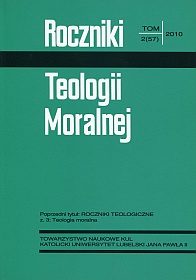The Sacramental Character of Moral Life
Abstract
The post-Council reflection on understanding sacraments and their significance for moral Christian life should show their personalistic and salutary, ecclesial and social dimension. Holy sacraments have the character of a personal encounter with Christ, and through Him – with the Father and the Holy Spirit. God turns to the man with His gift of salvation and makes him able to accept the gift and give an answer. Accepting sacramental gifts requires understanding the moral imperative in them, which makes a Christian's moral life acquire the style of sacramental life. The Church that is a sacrament, owing to the presence of Christ-Sacrament in it, is the natural environment for the growth and development of moral life. A new emphasis in the post-Council revival is that Christians, as members of the Church-sacrament, should become a „sacrament” of Christ's presence and His salutary mystery in the world.
References
Sobór Watykański II. Konstytucja o liturgii świętej Sacrosanctum concilium. W: Sobór Watykański II. Konstytucje – Dekrety – Deklaracje. Wyd. 3. Poznań 1986 s. 40-70.
Jan Paweł II: Encyklika Redemptor hominis. Watykan 1979.
− Encyklika Dominum et Vivificantem. Watykan 1986
− Encyklika Veritatis splendor. Watykan 1993
− Encyklika Ecclesia de Eucharistia. Watykan 2003.
− List apost. Dominicae cenae. Watykan 1980
− Kat. Świadectwo życia w Chrystusie w Kościele – wspólnocie prorockiej (20.05.1992) nr 3. W: Katechezy Ojca Świętego Jana Pawła II. Kościół. Kraków−Ząbki: Wydawnictwo „M” 1999 s. 124-127
− Kat. Misja prezbiterów w sakramentalnej posłudze uświęcania (5.05.1993) nr 1. W: Katechezy Ojca Świętego Jana Pawła II. Kościół s. 226-229
Katechizm Kościoła Katolickiego. Poznań: Pallottinum 2004
Bołoz W.: Eklezjalne aspekty moralności chrześcijańskiej. Tuchów: Wydawnictwo „Homo Dei” 1991
Dylus F.: Tajemnica Eucharystii w aspekcie eschatologii. W: Eucharystia. „Kolekcja Communio” nr 1. Poznań−Warszawa: Pallottinum 1986 s. 318-326.
Gocko J.: Kościół obecny w świecie – posłany do świata. Teologiczno-społeczne aspekty posłannictwa Kościoła w świecie po Soborze Watykańskim II. Lublin: Wydawnictwo KUL 2003
Greniuk F.: Sakramenty źródłem zobowiązań moralnych. RTK 34:1989 nr 3 s. 5-20
Jeżyna K.: Moralne przesłanie nowej ewangelizacji. Wezwanie do odnowy Kościoła iświata. Lublin: Wydawnictwo KUL 2002
Migut B.: Znaki Misterium Chrystusa. Historiozbawcze ujęcie sakramentów według Salvatore Marsilego OSB (1910-1983). Lublin: RW KUL 1996
Nadolski B.: Słowo Boże i sakramenty święte. W: Katechizm Kościoła Katolickiego. Wprowadzenie. Red. M. Rusecki, E. Pudełko. Lublin: RW KUL 1995 s. 149-163.
Nagórny J.: Eucharystia – we wspólnocie i dla wspólnoty. W: Eucharystia – miłość idziękczynienie. Homo meditans t. 9. Red. W. Słomka, A. J. Nowak. Lublin: TN KUL 1992 s. 126-140
Nagórny J.: Historiozbawczy fundament moralności chrześcijańskiej. W: Teologia moralna u kresu II tysiąclecia. Red. J. Nagórny, K. Jeżyna. Lublin: RW KUL 1998 s. 153-170
Rosato P. J.: Wprowadzenie do posoborowej teologii sakramentów. Tł. A. Baron. Kraków: Wydawnictwo WAM 1998

